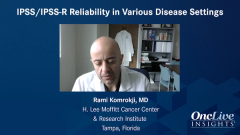
The Role of Supportive Care
Episodes in this series

Rami Komrokji, MD: Maybe we can start talking about the supportive care management that you use for your patients and move on to the treatment options.
Amy DeZern, MD, MHS: Sure. Just briefly, I sometimes smile when patients ask if I’m going to treat them and transfuse them, as if those are 2 separate buckets. To me, they go hand in hand. Anemia is the predominant cytopenia in many of these patients, so red cell transfusional support is key. I try to be judicious, though I also think anemia and health care–related interactions for these transfusions have to be balanced with the patient’s level of fatigue. Most of my patients are transfused somewhere between a hemoglobin level of 7 and 8 g/dL. For patients whose ferritin is creeping up from transfusional iron overload, if they can tolerate it, I am someone who believes in chelation. The chelators can be hard to tolerate at least in my practice from a GI [gastrointestinal] perspective, so I am not militant about it, but I do have attention to follow their ferritins and keep them on a regular transfusional course. Is that similar to how you monitor iron and keep these things going for quality of life?
Rami Komrokji, MD: Yeah, absolutely. I have the same experience. Patients sometimes think those things are not hand-in-hand: treatment and supportive care, and it’s important. Obviously, transfusions are a mainstay of what we do, and they do have impact, as you mentioned, on the long-run iron overload, the quality of life for patients coming every week or 2 for blood transfusions. I feel an economic factor that we don’t factor in sometimes is that transfusions are costly, and there is a lot of need for blood. That’s an important factor. I follow the same as you with the blood transfusions and platelets when needed if they are very low, below 10 per mm3. I tend not to use many growth factors for neutropenias. In the lower risk, I don’t think there’s any convincing evidence that they alter the outcome. Every now and then I’ll do prophylactic antibiotics if patients had recurrent infections, but not as a standard from the get-go for every patient. For iron overload, I think you and I are almost in the same camp. I do consider it, I discuss it with patients, and I’m not very rigid about it. The data are out there. Several retrospective studies suggest survival advantage, and they altered the size because they were retrospective. Plus, we know that high iron levels and high ferritin correlate with worse outcome. In the last couple of years, we heard from the TELESTO trial, which looked at the composite end point survival and hospitalization, and there was some benefit. My read on all the evidence is that there is probably benefit, but it should be individualized because of the adverse effects you mentioned.
Some guidelines say you should consider adding chelation above 1000 ng/mL ferritin, and some say above 2500 ng/mL. I do somewhere in between based on the trajectory of the course of the disease. Sometimes, if I have a very good response to treatment, I take that as an opportunity. If I know that the patient had gone through all the other treatments, I do iron chelation. I try not to introduce 2 variables together, so if I’m starting a treatment, I let it go for a few months, because if we get adverse effects, I don’t know if it’s from adding chelation or the treatment. I do consider it and discuss it with many of the patients. The issue with the iron chelators, especially the oral ones, is that there is some renal toxicity, and some GI adverse effects, so one has to keep that in consideration.
Transcript edited for clarity.














































